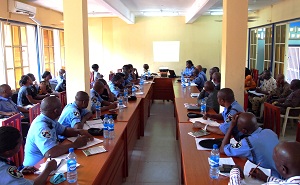April 2013
- Posting by PRAWA
- News

The date is Thursday 21th March 2013 and the venue is the Superior Officers Conference Room of Headquarters, Enugu
Objective of the seminar is to enhance the knowledge of the officers on how to investigate Rape cases as Heads of Crime Investigation Branches and Divisional Crime Officers. Mr. Philip Ogbadu, the Assistant Commissioner of Police; Criminal Investigation Department of the Nigerian Police Force Enugu State Command Headquarters had invited the PRAWA to attend the said seminar on Observer status.
The talk was presented by Dr. Okudo, an accomplished police Medical Practitioner. She started the lecture with an overview of what the Nigerian Law said about rape adding that the law of the Federal Republic of Nigeria prescribed life sentence as the punishment for any convicted person on rape charge. She described rape as the most serious crime against humanity after murder. She further described rape as non consentional sexual intercourse with same or opposite sex characterized by threat, harm and or actual force. Rape is said to have taken place in situations where penetration is accomplished, when the victim is unable to give consent or is prevented from resisting due to intoxicated drinks, drug or is unconscious due to sleep.
According to Dr. Okudo, factors to be considered when establishing that rape has taken place or has occurred include: age of victim. Saying that defilement of under-aged victim is same as rape, physical injury to the victim, use of threat or weapon, perpetrator’s age, mental capacity of victim, ability of victim under law to give consent, spousal relationship or other legal relationship of the victim and the perpetrator. She also talked on what constitute rape and linked it with definition of sexual assault and concluded that sexual assault is the broader term of rape.
On the epidemiology of rape, the speaker posited that about 8000 men and 8000 women interviewed revealed that 1 out of every 6 women had experienced an attempted rape or a complete rape. She further said that in United States of America, that 60% of women who reported rape are less than 18 years of age and further revealed that rape offences committed by acquaintances of victims are more than that of strangers.
On investigation of rape, Dr Okudo made the following prescriptions and steps that must be taken by the police investigating officer working on any rape case. This include asking the victim if she or he sustained serious physical injury that needs immediate medical attention, requesting for the identity of the perpetrator promptly and seeking for physical evidences such as semen, bruises and other evidences. Other steps are: making immediate arrangement for DNA tests and such secondary investigations and looking out for abrasions, bruises, lacerations on the victim. According to according to Dr. Okudo, research has shown that 8 – 45% of victims of rape show external trauma, most commonly in the mouth, throat, thighs etc.
Dr. Okudo also recommended arranging forensic identification of perpetrator and establishing the type of rape and other details immediately as some of the investigation processes to follow in rape cases. It must be noted according to the speaker that vast cases of rape are committed by known persons. The roles of police in investigating rape cases include the following: asking the victim about injuries, showing the victim empathy and concern, ensuring that medical treatment is given promptly, protecting the crime scene and physical evidences and obtaining physical description of the rapist and also getting the victim to explain what happen.
The impact of rape on the victim and the society are many according to the speaker. The most common reactions include shock and disbelief, remembering what happened can evoke intense emotions on the victim. The physical symptoms and health implications are not left out. The fear of contacting sexually transmitted diseases like HIV/AIDS is intense on the victim. The psychological trauma on victim is enormous because the victims often resort to self blame and shame
The role of Medical Doctors in given evidences aimed at conviction of offenders was also given serious attention in the lecture. The medical doctors who were present discussed this area using specific case studies and examples. It was a consensus that medical doctors have enormous roles to play in the conviction and otherwise of rapists. It was an issue also when the participants talked about delays in establishing medical evidences and arrest of offenders. The lecturer asked the doctors to always fast track bringing out evidences to establish rape cases’ adding that time is of essence in case of rape. If the medical doctors play their role very well in rape cases, it will help the police in pushing their cases through the courts.
During the interactive session, the participants noted that major problems facing the police often in rape cases include the disappearance of offenders and time the law gave for the case to be filled for prosecution to begin. The following scenario was painted by the participants to explain the problems: Every prima farce case to prosecute a rape victim has been established by the police. The evidences have been gathered and are complete but the rapist has not been arrested. The IPOs sought to know if the time given by law to either file the case or begin prosecution of the case can affect the case. The lecturer asked the participants to seek legal interpretation from experts but added that the law of the federal Republic of Nigeria cannot be cruel as to give any room for rapist to go free on technical legal terms.
The seminar on rape ended with an agreement of all participants that there is rapid growth of rape cases in Nigeria and that rape victims need empathy and love and not stigma.
